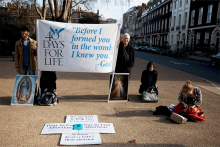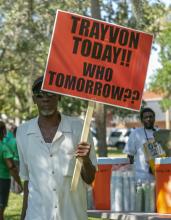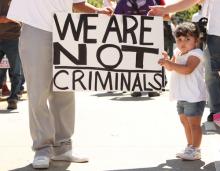Jeremiah

In the halls of empire, men sit at gleaming tables untouched by war, they speak of peace as though it is theirs to grant. But they have never gathered their children into one room to sleep at night so that if death comes, it takes them together. They have never watched the sky split open with fire, felt the air convulse after the blast, felt the wind howl past — hot, violent, and thick with the dust and scent of obliteration. And yet, they sign their names to ceasefires, shake hands, and expect the world to applaud. They do not blush as they bankroll the demolition of homes, the bombing of hospitals, and the erasure of entire families .
During the first week of February, U.S. President Donald Trump hosted Israeli Prime Minister Benjamin Netanyahu, whois the subject of an International Criminal Court arrest warrant for committing war crimes and crimes against humanity. This meeting took place as the fragile ceasefire agreement between the Israeli occupying forces and the Palestinian militant group, Hamas, hung in the balance. Trump, never one to concern himself with the nuances of international law (or any law, really), originally floated the idea of the U.S. “owning Gaza” on Feb. 4 and then has since doubled down on this colonial fantasy, one so crude and reckless that his own administration scrambled to downplay it.

BEFORE THE PANDEMIC hit, I could have told you the precise number of my indoor plants: zero. But then lockdown started and, like countless people around the world, I became obsessed with all things leafy and green. Once I learned how to keep a plant alive, I began to nurture cuttings. To see that first fresh leaf grow — an assurance that new roots had taken hold — filled me with a kind of joy heretofore unknown.
I needed to feel like life could not just survive, but flourish and thrive. “Give this at least six weeks before repotting,” I would text a friend from her porch as I dropped off the gift of a budding leafy monstera, “just to let the roots settle.” Then I’d trudge back to the sidewalk to watch my friend open her door, wave to me, and take this small extension of myself into her home. Months later, when we could visit in person, I’d get to see how much these little ones had grown. Great leafy extensions of love.
Most of the gospel readings this month contain horticultural parables — seeds and soil, wheat and weeds, sowers and reapers. Before the COVID-19 years, I had never read these parables through the eyes of someone who had nurtured plants to life. Their images had been abstractions, ideas, metaphors with no roots. But now that those seeds have grown, I see each one anew. Perhaps you do too?

I told my congregation that nine years earlier, on a cold January morning, I walked into a Planned Parenthood clinic.
Before you read further, let’s pause: What story do you think I’m about to tell? What assumptions about me or my circumstances did you make? Do you see me as someone with less moral authority than when you started reading? Take a moment to think.

Wealth advisers teach us why and where to stockpile our assets and how to diminish our liabilities. “Save! Save! Save! Put away for rainy days. Establish your kid’s college nest egg now! Buy low and sell high! Get real estate to get more bang for your buck! Don’t touch your 401(k) or you’ll risk having nothing for retirement!” And of course, they earnestly urge, “Set aside enough for taxes or be bitten by Uncle Sam in the end!” Any good wealth adviser aims to cure their clients of unsound “robbing Peter to pay Paul” financial practices. Managing portfolios calls for vigilance because markets can be highly volatile and thus vulnerable to external forces beyond one’s control. For this reason, sound investment strategy requires advanced planning, goal-setting, and staying focused. This month’s gospel readings address the importance of honoring one’s faith journey by carefully calculating costs and practicing disciplined stewardship.
These themes color the pages of Luke’s gospel but also inform Paul’s eldering counsel to his young devotee, Timothy. Paul writes: “There is great gain in godliness combined with contentment” (1 Timothy 6:6), for true satisfaction is discovered at the site of contentedness, not on “the uncertainty of riches” (verse 17).
Our spiritual ledgers get out of whack when wealth accrual is decoupled from gratitude and when we forsake practical wisdom. Dialing back the spiritual appetite for hoarding temporal goods is not only good stewardship but crucial for securing tomorrow’s sacred dividends. Having an appropriate perspective on wealth is the initial deposit for moving into the life-giving presence of a debt-canceling God.
September 1
Forsaking Fidelity
Jeremiah 2:4-13; Psalm 81:1, 10-16; Hebrews 13:1-8, 15-16; Luke 14:1, 7-14
Biblical storylines of God’s dealings with Israel vary little in terms of plot. The master narrative of unrequited love loops over and again in the prophetic literature. Taglines proceed in this order: “As they pursued worthless things, they forgot their first love and were forced to submit to the exacting demands of their foreign foes. Yet again, a faithful God is love-spurned by a prized people who contented themselves with serving lesser gods of their own making.” Sacred love tales of this sort get nauseating, at least I think so.

THE NATURE OF dishonor and consequence are what these passages teach. For the average Bible reader, the front matter of the book of Hosea—specifically the first three chapters—disturbs the conscience. At the time of Hosea’s calling, God’s first words are: “Go, take for yourself a wife of whoredom and have children of whoredom, for the land commits great whoredom by forsaking the Lord” (1:2). Wow!
The writer of Hebrews proposes an alternate reality: Any reality worth seeing comes into view through faith in the unseen (see Hebrews 11:1). Prophet Isaiah sees what God sees through another portrait. Like believers today, empty rituals and defiled worship strain Isaiah’s eyes. Do we have eyes to see what the prophet saw in our context of racial intolerance and religious bigotry? Harsh judgment meted out in scripture is generally in response to an act of rebellion or for defaulting on a covenantal agreement. An aggrieved God enters our contemporary global vineyard asking Christians today, “What more was there to do for my vineyard that I have not done in it? When I expected grapes, why did it yield wild grapes?” (see Isaiah 5:1-4).
The essential work of the guardian is to protect the investments. While we are not permitted to “psychologize” the prophet Jeremiah, we can still say that shame is evident. To say, “Why me, God?” rather than “Why not me?” is to be imprisoned by a faulty internal transcript.

It’s always tempting to read without context, or to quickly presume our own. In which case this might yield a bumper sticker for urban ministry: Seek the Welfare of the City. Or some universal and individual dictum of God’s love.
But time and place are crucial to interpretation. This one, from the prophet Jeremiah, was penned in the reign of King Zedekiah, between the first Babylonian invasion of Jerusalem in 597 B.C.E. and the final destruction of Jerusalem and temple in 587, with a second deportation. It is a letter sent to the exiles by way of the king’s official couriers. The location of the letter is betwixt and between. Written in Jerusalem, read in Babylon. For that matter, kind of like our situation.
So, from where do we read? Equally crucial to know. William Stringfellow, in his An Ethic for Christians and Other Aliens in a Strange Land, put it like this:

It is heartening to see that hope on display as the vision of a world where all flourish and human agency is honored and sustained. The vision on the website for Black Lives Matter is their Jeremiah’s “purchase ancestral lands.” It is Standing Rock’s protest. It is Breakfast and Book clubs springing up around the country. It is Freedom Schools. It is testament to the sentiment, “It will not always be thus.”

Aside from midnight church services, family reunions, and Ryan Seacrest parties, a significant number of people will celebrate New Year’s Day from the less festive setting of one of the many Syrian refugee camps, in countries like Greece, Turkey, Lebanon, Jordan, or Iraq. These camps symbolize the narrative of the millions of Syrians who have fled their homeland due to the civil war raging since 2011. Their past is filled with political and financial trauma associated with refugee life. Their future is even more threatening as they struggle to reunite with loved ones, deal with the tragic deaths, and readjust to a new life where their Syrian passports may be their single economic asset. Their future is largely unknown. For these survivors, what is so “happy” about 2016?

On Monday night as I read and watched the unfolding news coverage of riots, my Facebook newsfeed bombarding me with posts both from activists and from folks who hated the rioting but didn't care about Freddie Gray, I thought about saying a prayer for peace.
I started to pray, but God interrupted me, in the words of the prophet Jeremiah:
"They have treated the wound of my people carelessly,
saying 'Peace, peace,' when there is no peace.
They acted shamefully. They committed abomination.
Yet they were not ashamed."
Was I the “they?”
Who are God's people here?

IF WE FOLLOWED the church calendar and celebrated Epiphany in January, we wouldn’t have to cram the wise men into the crèche to compete with the shepherds. We could save all the “Star of Bethlehem” songs to brighten the cold days of January. Obviously, the magi needed a few weeks to prepare and then travel “from the East.”
A new bright object in the sky was certainly an “epiphany,” but it was not totally unexpected. These magi were astrologers, the ancient astronomers of their day. To the east of Jerusalem lay Babylon, birthplace of astrology and location of a large Jewish community. The discovery of two astrological books among the Dead Sea scrolls showed that the sign of Aries the Ram in the zodiac represented the reign of Herod the Great in Judea. Since Herod was aging, it is not surprising that Jewish astrologers were watching this royal constellation.
In a television series called Jesus: The Complete Story, astronomer Michael R. Molnar notes an unusual astrological conjunction on the night of April 17, in 6 B.C.E., the year Jesus was most likely born. At that time, both Saturn and the sun were in the constellation Aries, and then the moon eclipsed to reveal Jupiter, king of the planets, also in Aries. Jupiter shone into the dawn, another auspicious sign of royalty. It was confirmation enough to send these astrologers on their way.
Perhaps if we celebrated Epiphany after Christmas, we’d have more time to learn about this epiphany and its remarkable interpretation.

WE HAVE AMPLE reason to weep of late: war in Gaza, crisis in Syria, ISIS in Iraq, the slaying of five unarmed black men in one month at the hands of U.S. police officers, and the demise of congressional immigration reform.
Scripture calls us to cross over into the valley of lament at times such as these. Yet most of us are more comfortable on the plateau of rage or the plain of apathy.
I once led a training on lament and racial reconciliation. Twenty college students sat in the living room of a ministry house as I recited a lament from Jeremiah, the “weeping prophet”: “O that my head were a spring of water, and my eyes a fountain of tears, so that I might weep day and night for the slain of my poor people!” (9:1).
I spoke of the impact of racial injustice in our nation and on our campuses. I recounted slave narratives to the students—stories that had brought me to tears privately. Yet, when the last word was read, the students sat silent with glazed eyes staring back at me.
I didn’t get it. The whippings of human beings, the children separated from their mothers and fathers, the hands, feet, and lives lost in the midst of America’s darkest hours—these things happened. How could we not lament?

Our relationship to place is so conditioned by our life experiences. When I moved to North Cambridge, Mass., from the expansive West Coast, I got a lesson in the meaning of “near” and “far.” Walking around my new neighborhood, I greeted an old woman sitting in front of her house.
“Did you grow up around here?” I asked.
“Oh no,” she assured me, “I grew up way over on Sherman Street.” Sherman Street is about three blocks from where we were talking, but it is a different neighborhood. So in the language of her personal geography, Sherman Street is not “around here.”
When I traveled to Israel this summer with a group of seminary students from Andover Newton Theological School and Boston University School of Theology, what struck me most was another lesson of geography: If you live in a country the size of New Jersey, your sworn enemy might literally be your next door neighbor.

The book of Jeremiah straddles the most momentous event of Israel’s history: the destruction of Jerusalem and its temple and the exile of its leaders to Babylon (586 B.C.E.). In the first half of the book of Jeremiah, the prophet announces that God is furious with the people of Judah, in particular its leaders, because they have reneged on the covenant they made with God through Moses. They have not taken care of the poor, and they have not lived according to the stringent demands to worship God alone.
Not surprisingly, the leaders do not want to hear Jeremiah’s critiques of their ways of doing business. No politician wants to look weak – even before a god. According to Jeremiah, the leaders of Judah have prioritized – not the building of an ethical community – but their own comfort and position. Their desire to maintain their own power and influence has trumped everything. And these politicians have justified their behavior so many times and in so many ways, they don’t even recognize how far they have fallen from the ideal that guided the building of the nation.

Debates on immigration in the United States continue to move in the default direction of North/South. As such, the prominent debating points often direct public attention to the U.S./Mexico border fence and the Latina/o community. By sleight-of-hand, many in the mainstream media tend to recast a centuries-old U.S. immigration experience as a Latina/o problem.
Unlike the variety of migration stories in the Bible, the forces creating migration for many Latina/o families are closely tied to the issues of power and hyper-consumerism. Often as a last resort do immigrant families enter the northbound currents of low-wage laborers that, as Bishop Minerva Carcaño describes, feed “the economic machine in this country.”
Ever since the global financial cabal drove the world's economies into a ditch, popular movements have been rising up to fight "austerity measures" that exact punishment on the poor and leave the rich untouched. This is a familiar biblical meme for the definition of injustice. The words of the prophet Jeremiah come to mind: "Your clothes are stained with the blood of the poor and innocent" (Jeremiah 2:34).
"When Spanish mayor Juan Manuel Sánchez Gordillo recently led farmers on a supermarket sweep, raiding the local shops for food as part of a campaign against austerity, his political immunity as an elected assembly member protected him from arrest. He now asks other local mayors to ignore central government demands for budget cuts and refuse to implement evictions and lay-offs. In this era of austerity, such flagrant disrespect for the law ought to be encouraged. Sometimes, the greatest strength of popular movements is their capacity to disrupt. So here, for the benefit of imaginative indignados, are five examples of civil disobedience:
Wall Street has been devastating Main Street for some time. And when the politicians -- most of them bought by Wall Street -- say nothing, it's called "responsible economics." But when somebody, anybody, complains about people suffering and that the political deck in official Washington has been stacked in favor of Wall Street, the accusation of class warfare quickly emerges. "Just who do these people think they are," they ask. The truth is that the people screaming about class warfare this week aren't really concerned about the warfare. They're just concerned that their class -- or the class that has bought and paid for their political careers -- continues to win the war.
So where is God in all of this? Is God into class warfare? No, of course not. God really does love us all, sinners and saints alike, rich and poor, mansion dwellers and ghetto dwellers. But the God of the Bible has a special concern for the poor and is openly suspicious of the rich. And if that is not clear in the Bible nothing is.
Last week, The Washington Post's On Faith site devoted their weekly Q&A to the debate over social justice which they titled, "Wallis vs.